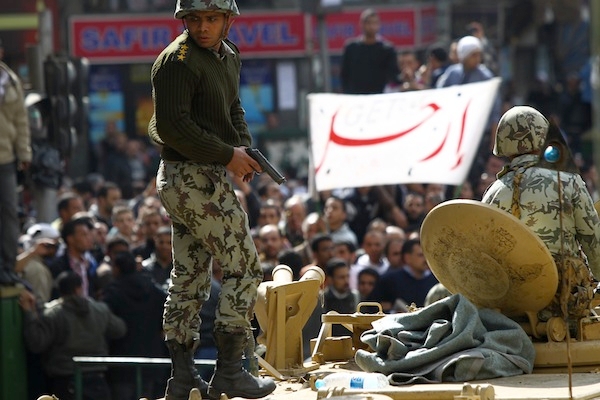There’s a joke doing the rounds in Tahrir Square which goes like this: ‘Nasser, Sadat, and Mubarak all tried to destroy the Muslim Brotherhood, but only Mursi succeeded’. As protests against the world’s oldest Islamist party intensify, the Brotherhood is now learning the price of power after decades of being confined to the political wilderness.
On the one hand there are very obvious reasons for the current discontent. Egypt’s fortunes have tanked since the revolution with its economy stagnating, rising inflation, increased corruption, and the near disappearance of its tourist industry. For all those invested in the revolution that swept away Hosni Mubarak it was never meant to be like this.
But there is a more significant undercurrent to Egyptian unrest too. Arab Muslims are also protesting against political Islam – an historic development – condemning Mohammed Mursi’s attempts to inflect a greater Islamic tone into Egyptian politics. When he ran for the presidency, Mursi promised to appoint both female and Coptic Christian representatives to the highest posts in his government (vice president and deputy vice president, respectively). He failed to deliver on either promise.
Post-revolutionary Egypt has been mired in the politics of self-interest. Egyptians have seen Mursi flying to Makkah for pilgrimage, leading prayers in the presidential palace, and floating ideas for an ‘Islamic solidarity summit’, while failing to address soaring levels of lawlessness and the economy. It has fuelled the perception that the Muslim Brotherhood is more interested in governing for itself rather than for the country.
The secular opposition is noisy and mobilised but has failed to institutionalise its grievances. They can deploy millions on the streets but as the uprising to overthrow Mubarak demonstrated, upheaval alone is necessary but insufficient. In more than two years the opposition has failed to cultivate its own leaders, charismatic spokespeople, or develop an alternative manifesto.
With the current wave of protests the Egyptian state is at risk of complete collapse. In many senses, it has already imploded. The army is now the only functioning civic institution, and even it finds itself deeply divided. The head of the armed forces General Abdel Fattah al-Sisi, was appointed by Mursi precisely because of his Islamist sympathies while some members of his family are known to be active within the Brotherhood.
Sisi would rather see Mursi resolve the current situation and opposes a coup. The decision by the Supreme Council of the Armed Forces (SCAF) to impose a 48 hour deadline on Mursi to find a solution to the current crisis therefore reveals just how torn the armed forces are. Most of the SCAF remain deeply opposed to the Brotherhood.
Where does all this leave Egypt? In many respects the country is beginning to resemble the failures of Pakistan. Its civic institutions are weak and, where functioning, are threadworn and riddled with corruption. The country itself is also deeply divided, fractured between urban elites and the rural poor, divided between secularists and religious fanatics.
Transcending all this is the army. Seen as a truly national institution that protects both the country and its people, the armed forces operate beyond the law, are unaccountable, and exercise greater power than the civilian administrations they ostensibly serve. A Zogby poll conducted in May revealed that the Egyptian army’s approval rating stood at 94 percent while Mursi’s had slumped to just 28.
Each side is now backed into an intractable position. The opposition wants Mursi gone. Their protests would have been meaningless had the army not backed them by issuing their ultimatum. As for Mursi, he is refusing to leave and has defiantly told the armed forces to rescind their deadline.
The Muslim Brotherhood are the immediate victors of the ensuing quagmire. Mursi’s supporters have used the time to organise sizeable counterdemonstrations demanding that he be given a chance to govern. This is where the Brotherhood flourishes. Its government may be characterised by incompetence and a lack of vision, but the group knows how to deploy loyalist jackboots on the streets to demonstrate public support.
From Syria to Libya to Egypt, the various upheavals of the Arab uprisings reveal something quite telling about the nature of power in the Middle East – that it is concentrated in the hands of two disparate and antagonistic forces: political Islamists and the armed forces.






Comments